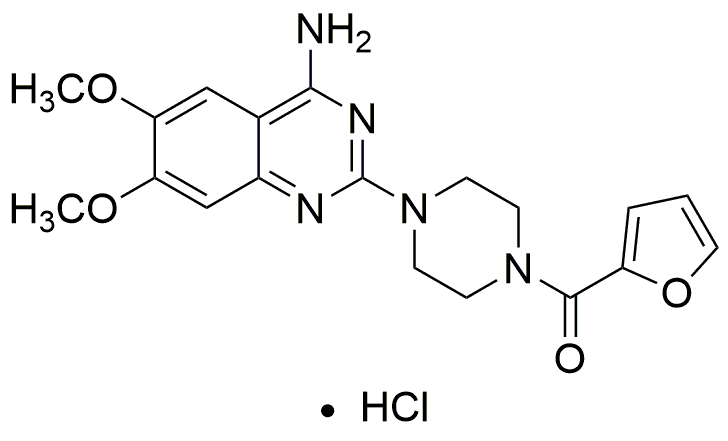Prazosin hydrochloride is widely utilized in research focused on:
- Hypertension Treatment: Commonly prescribed for managing high blood pressure, it helps relax blood vessels, improving blood flow and reducing strain on the heart.
- Benign Prostatic Hyperplasia (BPH): Used to alleviate urinary symptoms associated with BPH by relaxing muscles in the prostate and bladder neck, enhancing urine flow.
- Post-Traumatic Stress Disorder (PTSD): Investigated for its effectiveness in reducing nightmares and improving sleep quality in individuals suffering from PTSD.
- Research in Cardiovascular Health: Employed in studies to understand its effects on heart function and vascular health, providing insights into potential new treatments.
- Animal Studies: Utilized in veterinary medicine to manage hypertension and heart conditions in pets, showcasing its versatility across species.
General Information
Properties
Safety and Regulations
Applications
Prazosin hydrochloride is widely utilized in research focused on:
- Hypertension Treatment: Commonly prescribed for managing high blood pressure, it helps relax blood vessels, improving blood flow and reducing strain on the heart.
- Benign Prostatic Hyperplasia (BPH): Used to alleviate urinary symptoms associated with BPH by relaxing muscles in the prostate and bladder neck, enhancing urine flow.
- Post-Traumatic Stress Disorder (PTSD): Investigated for its effectiveness in reducing nightmares and improving sleep quality in individuals suffering from PTSD.
- Research in Cardiovascular Health: Employed in studies to understand its effects on heart function and vascular health, providing insights into potential new treatments.
- Animal Studies: Utilized in veterinary medicine to manage hypertension and heart conditions in pets, showcasing its versatility across species.
Documents
Safety Data Sheets (SDS)
The SDS provides comprehensive safety information on handling, storage, and disposal of the product.
Product Specification (PS)
The PS provides a comprehensive breakdown of the product’s properties, including chemical composition, physical state, purity, and storage requirements. It also details acceptable quality ranges and the product's intended applications.
Certificates of Analysis (COA)
Search for Certificates of Analysis (COA) by entering the products Lot Number. Lot and Batch Numbers can be found on a product’s label following the words ‘Lot’ or ‘Batch’.
Número de catálogo
Número de lote/lote
Certificates Of Origin (COO)
This COO confirms the country where the product was manufactured, and also details the materials and components used in it and whether it is derived from natural, synthetic, or other specific sources. This certificate may be required for customs, trade, and regulatory compliance.
Número de catálogo
Número de lote/lote
Safety Data Sheets (SDS)
The SDS provides comprehensive safety information on handling, storage, and disposal of the product.
DownloadProduct Specification (PS)
The PS provides a comprehensive breakdown of the product’s properties, including chemical composition, physical state, purity, and storage requirements. It also details acceptable quality ranges and the product's intended applications.
DownloadCertificates of Analysis (COA)
Search for Certificates of Analysis (COA) by entering the products Lot Number. Lot and Batch Numbers can be found on a product’s label following the words ‘Lot’ or ‘Batch’.
Número de catálogo
Número de lote/lote
Certificates Of Origin (COO)
This COO confirms the country where the product was manufactured, and also details the materials and components used in it and whether it is derived from natural, synthetic, or other specific sources. This certificate may be required for customs, trade, and regulatory compliance.


